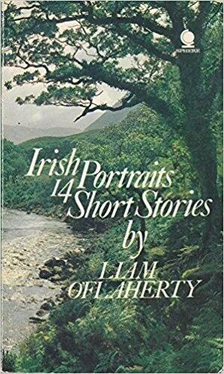“Yes,” he said, in a childish feminine voice, “it’s rather horrible, what people … I mean … things are turning out rather… it’s unrest, I suppose and… science.”
Then he found courage to look at her, because, with a sudden twist, his mind had become like hers, a mind hostile to rebellion and to the desires of the flesh, only with the difference that his mind was more violent and passionate than hers and it would now like to gouge out the eyes of the atheistic soldiers and burn all Protestants and heretics in a big fire. Whereas her mind, behind the cruel cold eyes, watched suffering and torment without movement and saw that they were good.
Her eyes turned wearily and contemptuously from her husband’s nervous twitching face. She sighed and said wearily:
“Science, thy name is sin. No, Joseph, it’s not science, but the coming of Antichrist. I can feel it in the growing generation. It’s truly horrible, but I can even see signs in your nephew that he is becoming a prey to the immoral teachings of the College of Science. He laughs immoderately and yawns when I talk to him of his religious duties. He makes too free with the servants.”
His eyes wandered from her face as she spoke. They rested on her undeveloped breasts that were like a flat board against the bedclothes. In a flash he smelt the sun-baked plains of Mexico and saw bronzed horsemen galloping with screaming nuns on the pommels of their gaudy saddles. “The curse of the cinema,” she had said. The hot voluptuous sun and the stretching long-grassed golden plains made his flesh throb where the new underclothing grated against it. He shuddered and said almost angrily:
“I am at the end of my patience. Unless he mends his ways…. Well, it’s hard … my dead brother’s son … and we … God didn’t bless us with children, but … nothing but ruin can come of the company he keeps … his drinking and if what I hear is true… women.”
“Women,” said Mrs. Timmins, “you haven’t told me anything about…”
“My dear,” said Mr. Timmins, “I didn’t want to disturb … I’m not certain and in your condition …”
“Joseph,” said Mrs. Timmins. “You must put your foot down. At once. It’s your weakness that’s responsible. He must leave the college at once. Take him into your office.”
Mr. Timmins began to speak, but he became inarticulate and he wrung his hands. His face became crimson. He was trying very hard to feel violent against his nephew, but all the time he felt the impact of hot voluptuous sunrays against his irritated flesh and he had visions of wild lawless men in rolling golden plains, herding women.
There was a knock at the door. Then the parlourmaid entered.
“Dinner is served, sir,” she said. “Will you have your beef-tea now, ma’am?”
“Yes,” said Mrs. Timmins. “And I think I’ll try a little chicken, Kitty. A little breast.”
“Yes, ma’am. Do you want some more coal on the fire?”
“Do.”
While the maid was at the coal-scuttle, Mr. Timmins got up and kissed his wife reverently on the forehead. Her skin was yellow and clammy. His lips quivered as they touched her skin. She called him back from the door, waited until the parlourmaid had left the room and then said in a very severe tone:
“You must speak to him. Don’t let me have to do it.”
Then Mr. Timmins went out hurriedly. He hurried without being aware of it, fondling the tip of his little thin beard and moving his lips. When he turned the corner and came to the stairhead he realized the cause of his hurried movements. The parlourmaid was tripping down in front of him. Immediately he flushed and thought of the golden rolling plains, the swishing of the long grass and the flying hoofs of the sweating horses. Everything hot under the boiling sun. His lips grew dry as he went down the stairs in the wake of the comely silken legs and saw, resisting, conscience striken, the curve of her body and the undulating glossy hair rising from her soft white neck. And he saw that she was young and soft and round and fresh, like a young flower wet with dew, opening out its honeyed cup to a wandering bee.
The maid went off across the hallway towards the kitchen. It was dim there where she disappeared and her tall straight figure, swaying voluptuously at the hips, became alluring among the shadows. When she disappeared something began to burn in his chest, for a few moments only, a pang of mingled joy and sadness. It was queer, both unpleasant and violently intoxicating.
He passed the dining-room door and went into the drawing-room to look for his nephew. The drawing-room was empty. He went through to the dining-room. His nephew was standing at the sideboard and he put down something hurriedly that clinked. Mr. Timmins flared up at once.
“Drinking?” he said, in a low tense voice.
The nephew turned round, calmly sticking a coloured handkerchief into his outside breast pocket. He was a young man of twenty, low-sized and powerfully built. His face had already become slightly coarse. His strong neck, his curly dark hair and the contemptuous expression of his grey eyes made him attractive, in the way that stupid, strong men are attractive.
“Hello, Unce Joe,” he said carelessly in a deep bass voice. “What’s the matter? Everybody takes a pick-me-up before dinner now. I don’t feel up to scratch. That match yesterday was a bit tough.”
“I have a few words to say to you, Reggie,” said Mr. Timmins.
“What about?” said the nephew.
The parlourmaid entered with the soup. They took their seats, facing one another across the table. Mr. Timmins watched his nephew’s eyes. The nephew smiled slyly at the parlourmaid and he looked at Mr. Timmins with a vacant stare and fiddled with his napkin. As the parlourmaid leaned over his shoulder with his soup, Mr Timmins again felt that sensation of something burning in his chest. The maid left the room. Mr Timmins put down his spoon and began to speak furiously.
“She insists on your leaving the College of Science,” he said, “and I must own … well, I quite agree with her. For your father’s sake, Reggie … Well, I tried my best to … give you your own way and to … What return do you make? What’s going to become of you, I say? Twice during the past week I have been approached by friends. Yes. Mrs. Turnbull stopped me in the street, waved her umbrella in my face and accused you of dragging her Andrew into the ways of the devil. Do you think I hear nothing? I’m told everything, even about your champagne dinner at Jammet’s with a common bookmaker.”
The nephew broke bread and said calmly:
“That was on a bet, uncle. Ye can’t expect a man …”
“A man,” said Mr. Timmins. “You call yourself a man. I would forgive you for squandering my money if it was for a good purpose. I’m not mean. Your father left me a sacred trust. Lord have mercy on him, his ways were not mine and he died penniless. But I’m not mean. God didn’t bless us with children. What I have is yours. But it’s a hopeless and miserable end to a life of labour and … and self-denial to think that … Eh? What’s going to become of you? She says I’m weak and it’s time. What can I do? Have you no conscience? Football, drink and bad company are no fitting preparation for the … Do you or do you not want to?”
The nephew pushed away his empty plate and put his arms on the table.
“Listen, Uncle Joe,” he said calmly.
“Sit properly in my presence,” said Mr. Timmins angrily.
“Oh, all right,” said the nephew, “ye might let us have a meal in peace. There’s something I wanted to ask you about only I’ll wait till afterwards. Ye know it’s bad for yer digestion talking during meals. I heard Dr …”
“Silence!” shouted Mr. Timmins.
Читать дальше












